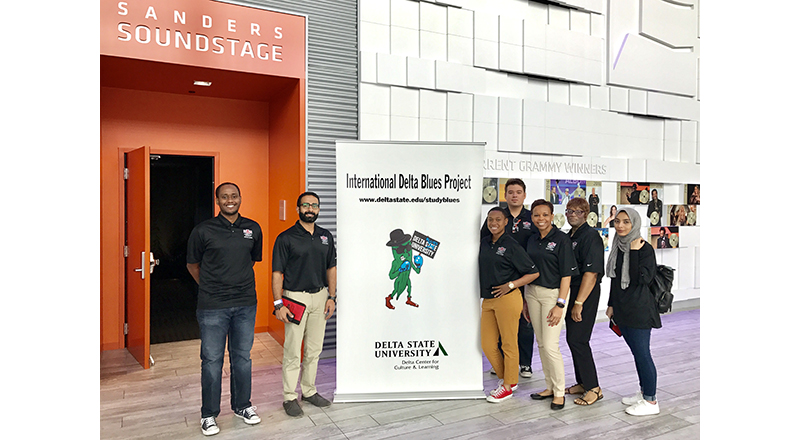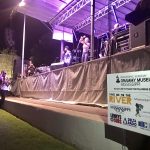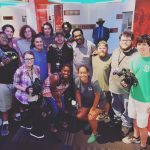Pictured (l to r): Dr. Charles McAdams, provost and vice president of Academic Affairs; Dr. Rolando Herts, director, The Delta Center for Culture and Learning and Mississippi Delta National Heritage Area; William N. LaForge, president, Delta State University; Fonce’ Bates, acting superintendent, Vicksburg Military Park; and Dr. Myrtis Tabb, board chair, Mississippi Delta National Heritage Area. Photo by Will Jacks.
The Delta Center for Culture and Learning at Delta State University and the Mississippi Delta National Heritage Area recently received 2016 National Park Service Centennial Awards for creating the Delta Jewels Oral History Partnership.
The cultural heritage interpretation project has honored the lives of unsung Mississippi Delta church mothers featured in Alysia Burton Steele’s book, “Delta Jewels: In Search of My Grandmother’s Wisdom.” Delta State was the only higher education institution and the MDNHA was the only National Heritage Area to receive a NPS Centennial Award this year.
“The Mississippi Delta National Heritage Area and The Delta Center demonstrated exceptional leadership and creativity in organizing 15 community gatherings with Alysia Burton Steele and several of the Delta Jewels featured in the book,” said Chris Abbett, associate regional director of partnerships, interpretation and education at the National Park Service Southeast Regional Office. “The programs throughout Mississippi, as well as the Smithsonian Anacostia Community Museum in Washington, D.C., connected with and helped to create the next generation of visitors, supporters and advocates for the National Park Service.”
“We are honored to receive this esteemed recognition from the National Park Service for this important cultural heritage development project,” said Dr. Rolando Herts, director of The Delta Center and executive director of the MDNHA. “The fact that Delta State and the MDNHA are acknowledged together truly demonstrates the power of partnerships and collaboration when telling the Delta’s story.”
For 18 months in 2015 and 2016, the Delta Jewels Oral History Partnership’s community gatherings engaged over 1,000 Mississippi Delta residents, visitors and supporters. The gatherings took place in diverse, welcoming venues throughout the state including universities, churches and tourism and cultural centers.
Delta State President William N. LaForge said he was thrilled with the NPS recognition.
“I am very pleased that Delta State’s Delta Center for Culture and Learning, along with our partner the Mississippi Delta National Heritage Area, are recipients of the United States National Park Service Centennial Award. This recognition helps validate the good work the center and the MDNHA are doing here at Delta State and througought the Mississippi Delta.”
“We are thrilled with the results of the Delta Jewels partnership,” said Dr. Myrtis Tabb, chair of the MDNHA. “This program was one of our very first and was extremely successful right off the bat. We are eager to build upon that success with continued partnerships that will help share the diverse stories of the Mississippi Delta.”
The Delta Center has continued to give presentations with Steele in 2017. These presentations have focused on community impacts documented in the Delta Jewels Oral History Partnership 2015-2016 Report.
Recent presentations include the National Heritage Areas Southeast Region workshop in Atlanta, Georgia; the Smithsonian African American Interpretation Workshop in Charleston, South Carolina; the NPS Collaboration Clinic in Biloxi, Mississippi; and the Association for African American Museums conference in Washington, D.C. In addition, Herts and Steele have been invited to present at the upcoming Oral History Association conference in Minneapolis, Minnesota.
“We have used the report as an interpretive and educational resource, which enhances the storytelling experience,” said Steele, a Pulitzer Prize-winning photojournalism professor at the University of Mississippi. “In addition to photos from the community events, the report includes survey results from participants. An overall program rating of 4.9 out of 5 clearly indicates that sharing the Delta Jewels’ oral histories have had positive impacts in the communities we engaged.”
The MDNHA and The Delta Center commemorated the 2016 NPS Centennial through other projects and events. Together, they organized an opening reception with Delta State University’s 2015 Winning the Race conference featuring former NPS director Bob Stanton.
In addition, the MDNHA Passport to Your National Parks program attracted NPS Centennial travelers, and a MDNHA promotional video was screened at a NPS Centennial film festival in Atlanta. Since its release, the video has been viewed over 20,000 times on social media.
To download the Delta Jewel Oral History Partnership 2015-2016 report, visit The Delta Center’s publications webpage at http://deltacenterdsu.com/publications/. To view the MDNHA promo video, visit the MDNHA website at http://www.msdeltaheritage.com/.
The mission of The Delta Center is to promote greater understanding of Mississippi Delta culture and history and its significance to the world through education, partnerships and community engagement. The Delta Center serves as the management entity of the MDNHA and is the home of the International Delta Blues Project and the National Endowment for the Humanities “Most Southern Place on Earth” workshops.















